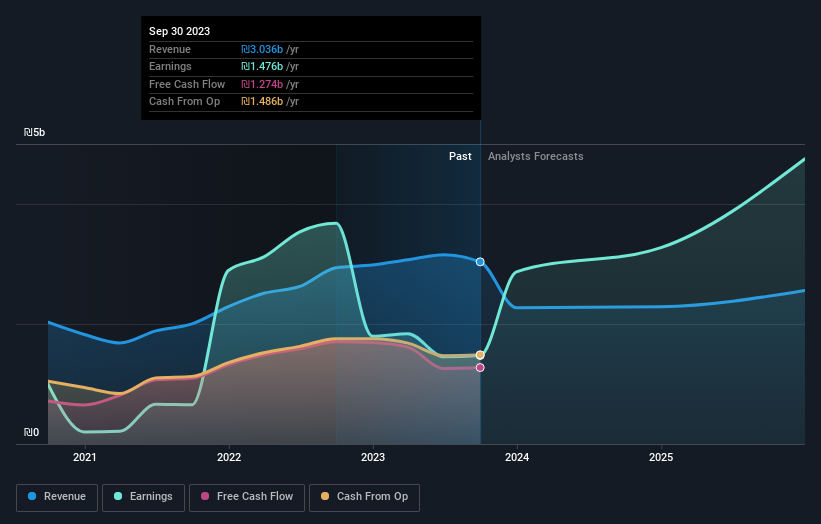- Israel
- /
- Real Estate
- /
- TASE:AZRG
While individual investors own 37% of Azrieli Group Ltd (TLV:AZRG), private companies are its largest shareholders with 56% ownership

Key Insights
- Azrieli Group's significant private companies ownership suggests that the key decisions are influenced by shareholders from the larger public
- 56% of the company is held by a single shareholder (Azrieli Holdings Inc.)
- Using data from company's past performance alongside ownership research, one can better assess the future performance of a company
A look at the shareholders of Azrieli Group Ltd (TLV:AZRG) can tell us which group is most powerful. The group holding the most number of shares in the company, around 56% to be precise, is private companies. That is, the group stands to benefit the most if the stock rises (or lose the most if there is a downturn).
And individual investors on the other hand have a 37% ownership in the company.
Let's take a closer look to see what the different types of shareholders can tell us about Azrieli Group.
See our latest analysis for Azrieli Group

What Does The Institutional Ownership Tell Us About Azrieli Group?
Many institutions measure their performance against an index that approximates the local market. So they usually pay more attention to companies that are included in major indices.
Azrieli Group already has institutions on the share registry. Indeed, they own a respectable stake in the company. This can indicate that the company has a certain degree of credibility in the investment community. However, it is best to be wary of relying on the supposed validation that comes with institutional investors. They too, get it wrong sometimes. If multiple institutions change their view on a stock at the same time, you could see the share price drop fast. It's therefore worth looking at Azrieli Group's earnings history below. Of course, the future is what really matters.

Hedge funds don't have many shares in Azrieli Group. Azrieli Holdings Inc. is currently the company's largest shareholder with 56% of shares outstanding. With such a huge stake in the ownership, we infer that they have significant control of the future of the company. Meanwhile, the second and third largest shareholders, hold 1.2% and 0.9%, of the shares outstanding, respectively.
While studying institutional ownership for a company can add value to your research, it is also a good practice to research analyst recommendations to get a deeper understand of a stock's expected performance. While there is some analyst coverage, the company is probably not widely covered. So it could gain more attention, down the track.
Insider Ownership Of Azrieli Group
The definition of an insider can differ slightly between different countries, but members of the board of directors always count. Management ultimately answers to the board. However, it is not uncommon for managers to be executive board members, especially if they are a founder or the CEO.
I generally consider insider ownership to be a good thing. However, on some occasions it makes it more difficult for other shareholders to hold the board accountable for decisions.
Our data cannot confirm that board members are holding shares personally. It is unusual not to have at least some personal holdings by board members, so our data might be flawed. A good next step would be to check how much the CEO is paid.
General Public Ownership
With a 37% ownership, the general public, mostly comprising of individual investors, have some degree of sway over Azrieli Group. This size of ownership, while considerable, may not be enough to change company policy if the decision is not in sync with other large shareholders.
Private Company Ownership
We can see that Private Companies own 56%, of the shares on issue. It might be worth looking deeper into this. If related parties, such as insiders, have an interest in one of these private companies, that should be disclosed in the annual report. Private companies may also have a strategic interest in the company.
Next Steps:
It's always worth thinking about the different groups who own shares in a company. But to understand Azrieli Group better, we need to consider many other factors. For instance, we've identified 3 warning signs for Azrieli Group (1 shouldn't be ignored) that you should be aware of.
If you would prefer discover what analysts are predicting in terms of future growth, do not miss this free report on analyst forecasts.
NB: Figures in this article are calculated using data from the last twelve months, which refer to the 12-month period ending on the last date of the month the financial statement is dated. This may not be consistent with full year annual report figures.
New: Manage All Your Stock Portfolios in One Place
We've created the ultimate portfolio companion for stock investors, and it's free.
• Connect an unlimited number of Portfolios and see your total in one currency
• Be alerted to new Warning Signs or Risks via email or mobile
• Track the Fair Value of your stocks
Have feedback on this article? Concerned about the content? Get in touch with us directly. Alternatively, email editorial-team (at) simplywallst.com.
This article by Simply Wall St is general in nature. We provide commentary based on historical data and analyst forecasts only using an unbiased methodology and our articles are not intended to be financial advice. It does not constitute a recommendation to buy or sell any stock, and does not take account of your objectives, or your financial situation. We aim to bring you long-term focused analysis driven by fundamental data. Note that our analysis may not factor in the latest price-sensitive company announcements or qualitative material. Simply Wall St has no position in any stocks mentioned.
About TASE:AZRG
Azrieli Group
Operates in the real estate industry primarily in Israel and the United States.
Average dividend payer with moderate growth potential.


